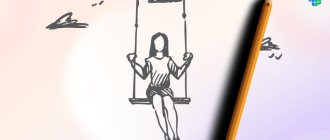If you feel that you are not doing what you are passionate about, if it is becoming increasingly difficult for you to organize your day at a job you don’t like, maybe it’s time to quit everything and start over? This can be done immediately after graduation, and when you are counting the years until retirement - it would be a good idea to have a reliable guide to the changes at hand. Now it is there - “My notepad. Ikigai" will help you understand yourself and offers you to take a test to do this.
Imagine that every morning, waking up with the first rays of the sun, you joyfully anticipate what the coming day has in store for you! Hurry up to get out from under the covers to enjoy the exciting moments you've been waiting for.
No, you don't have to travel by plane to your dream holiday in Bali! What is the reason for this feeling of happiness? It's simple: you feel harmony, serenity and confidence because you have found your place in life, your driving force, you have found your purpose, your inner compass... As the Okinawans say, you have found your... ikigai.
By cultivating this same ikigai, you gain spiritual harmony, and this state of mind extends to all areas of your life.
Are you striving to find your dream job? It's easy when you know what you were created for and where the key is to unlock your potential.
Do you want to make the right decisions and stick to them? As easy as pie! But first, decide what your heart really lies in and why you are doing this or that.
Do you want your life to be filled with passion and enthusiasm? This is much easier to achieve when everything makes sense and you understand what exactly brings you true joy and satisfaction.
“Is there a method that allows me to feel fulfilled and in my place?” - you ask. Yes! Through Ikigai circles, you will learn how (and why) to connect what you love to do (and what brings you joy), what you are good at (and what makes you proud), and what what you can do for a living (and what makes you feel safe), and what the modern world actually needs (what makes sense). The goal is to find approaches to your passions, talents, mission, profession and calling, in other words, to understand what you were created for, what your purpose is.
So, everyone has ikigai - and the search for it begins with immersion in oneself in the mode of introspection.
Test “What is your iki status?”
Before you go looking for ikigai, take a test that will help you understand where you are now and how much further you have to go.
1. As a child, when you were asked what you would like to do when you grow up, you answered that your dream was...
A) Sell books... no, serve in the police... no, be a princess... (In other words, nothing specific, a little of everything.) B) Choose the same profession as your mom (or dad). C) Become a heart surgeon (or any other clearly defined profession).
2. On Instagram, a model whose blog you follow posted a photo of her swimming in a pool on the premises of a luxury hotel. You will exclaim:
A) “Great photo, awakens dreams!” And mark for yourself the name of the hotel and the model of the swimsuit. B) “She shouldn’t use the moment like that by participating in a photo shoot! Although, on the other hand, it must be so nice to know that the job is done...” So you are a little jealous of her, but at the same time you condemn her. C) “Oh, if I had decided to start my own beauty blog five years ago, I would be in her place now!”
3. You are sitting with your friends in a restaurant and, when the conversation touches on political issues, sometimes quite sharp ones, you tense up because you don’t quite agree with what you hear...
A) You listen carefully, trying to understand the position of those present, and are ready to change your attitude towards these issues if necessary. B) You don’t really interfere in the argument, but only try to move the conversation onto more harmless lines by making witticisms or filling glasses. “Who needs more sangria?” C) You dare to express your special opinion, even if it is completely opposite to the point of view expressed by your friends, despite the fact that you risk saying goodbye to the company before the end of the evening.
4. What “gift” would greatly improve your life right now?
A) More self-confidence and self-esteem. B) More time and productivity. C) More clarity and focus.
5. You found out that one of your colleagues has a low opinion of you...
A) You call her for a conversation and try to explain how wrong she is, because you are the embodiment of genius! B) You exclaim: “This is nonsense! It's impossible to please everyone." C) You say to yourself: “Wow! It probably has something to do with my performance at the last meeting...” And then you constantly think about it and feel awkward.
6. “What do you do in life?”
A) This question is unpleasant for you, you know that people tend to judge you by your place of work or study, and you consider this method of assessing your personality to be too simplistic. B) This question scares you: you don’t really like what you do, so you either have to hide it, or admit it bitterly, or explain yourself... C) You meet this question with enthusiasm, because you love talking about your current activities and listen to others talk about their work.
7. For you, giving yourself pleasure means...
A) Go shopping or eat half a bar of chocolate. B) Chat without purpose or sit through an interesting lecture. C) Meditate or take a bath.
Now count the number of answers A, B and C.
When and how to take a career guidance test
You can determine your future profession from the eighth grade. It is advisable to take tests every year to take into account changes in interests or, conversely, to confirm your choice.
Conduct testing in a calm, neutral environment. For the most accurate results, avoid situations where you are under the influence of movies, factory tours, or professional interactions.
In all tests you need to choose one of several options. Read carefully and mark what you like best, or how true the proposed statement is for you.
Most answers A. Your life is like galleys!
You are inquisitive and by nature a cheerful and enthusiastic person. Everything interests you, everything inspires you. You want to try everything in life. You love to travel, read a lot, improve your level of education... You never have enough time for everything, but the desire to try does not disappear.
From a professional point of view, you quickly become bored with any routine work, so you often question the value of what you do. You see yourself as a web developer, graphic designer, CEO of your business, gardener or yoga instructor - depending on the day and mood. You do not have a particular passion for anything specific, but you have vague desires, because the sources of joy for you are diverse.
This curiosity is your driving force. But then where does this feeling come from that you are like a rower on a galley? The point is that you don't really know where you're going. Sometimes your head is spinning from successive desires. You act, and this is great, but you still haven’t realized why you are doing all this and why you sometimes worry.
What is your ikigai? You cannot determine this when you are in this state, because your internal compass has gone crazy and it is not clear where you belong. You will gain more clarity by understanding what interests you in life and discovering some common denominator in these many sources of joy. You should also learn to make more and more balanced and wise decisions that are in harmony with your inner essence and with the interests of other people who surround you, and then go all the way in implementing these decisions.
Advertising
Meet people with interesting professions
Meet representatives of new and interesting areas. You can find them among friends, on the Internet, or at some open lectures or forums. Find out what they do every day, that is, literally what their job consists of.
Ask what they like and don't like about the profession. This will help you understand how close she is to you, whether you can cope with her and whether you should consider her as an option for yourself. For example, the profession of a TV presenter or actor may seem like a complete holiday from the outside, although in fact it is quite expensive both emotionally and physically. And if the disadvantages of something don’t scare you and you feel that you could handle it, move towards your dream.
Most of the answers are B. It's a complete mess!
Your ikigai, like your potential, is just waiting to be realized. It smolders inside you, a weak ikigai fire, it trembles a little and warms you slightly... but you yourself do not allow it to flare up! Why? Yes, perhaps because you don’t feel capable of this, saying: “This is not for me.” Or because the very phrase “life purpose” makes too strong an impression on you, you whine plaintively: “What can I give to the world? The question itself makes me shiver!”
Your modesty borders on self-doubt, which sometimes leads you to self-sabotage. Your quiet inner voice haunts you, instilling disbelief in your own strengths and capabilities: “Give it up, nothing will work out for you anyway.” Or you tend to believe that others have greener grass: you often compare yourself with others and rarely come out a winner in this game (at least in your perception). The pessimistic remarks that you hear addressed to you and to which you attach too much importance do not help you either; you have come up with the following excuse for yourself: “There is no point in trying, as you know, it’s all useless...”
What if you dare to be yourself, truly, without fear of the unknown, change, failure, other people's views, without limiting yourself in anything? Down with modesty! To change, take a close look at yourself without criticizing - and you will discover positive qualities, talents, dare to awaken passions, shed light on your value system, show them first to yourself and then to the whole world. It's time to let go of the internal (and external) brakes that are holding you back from reaching your fullest potential and living the life that is truly yours!
What career guidance tests are there and how do they work?
There are two main methods for determining career guidance: the Klimov test and the Holland test.
Both allow, based on personal characteristics, to select a profession in which a person can fully reveal all his talents. Klimov’s system is aimed at finding the most suitable professional field. There are five of them, and they are divided according to the types of objects that you will have to deal with during work:
- A person is a person (teacher, salesman, doctor, lawyer).
- Man is nature (veterinarian, biologist, physicist, geologist).
- Man is technology (engineer, electrician, mechanic, designer).
- Man is a sign system (programmer, linguist, proofreader, topographer).
- A person is an artistic image (writer, actor, musician, artist).
Holland's technique helps determine the personality type and type of activity to which a person is predisposed. There are six types in total:
- Realistic - practical work using physical strength and dexterity, giving quick results (carpenter, agronomist, confectioner).
- Intellectual - research activities and solving abstract problems that require creative abilities and innovative thinking (astronomer, philosopher, mathematician).
- Social - work that is based on interaction with other people, analysis of their actions and training (manager, journalist, educator).
- Artistic - acting, stage and artistic activities where high emotional sensitivity, imagination and perception are important (artist, designer, sculptor).
- Entrepreneurial - organizational work that requires leadership and the ability to make decisions in a difficult environment (entrepreneur, producer, director).
- Conventional - clerical activities and specific tasks related to calculations and documentation (clerk, banker, secretary).
Most answers Q. You are the embodiment of iki-harmony!
Bravo, you have made significant progress on your path to ikigai without even knowing it. Even as a child, you knew what you would do as an adult, and you were able to establish yourself as an individual. You have life goals and you provide yourself with the means to achieve them. Along the way, you have already collected a lot of evidence and now know quite well what things bring you true joy. In other words, you take care of your daily well-being and avoid bad influences: no one will dare to pull you down... anyone, but not you!
You have partially figured out what you like to do, and you roughly know where to go. The halfway point has already been passed, but you still have to connect these small joys with something more significant to determine your ikigai. Thinking about yourself is healthy and even necessary, but if you are only concerned with personal well-being, then you risk forgetting about the main thing: you need to share this joy of life with others, this will help you find the true meaning of existence. You already know what you love and what you are strong at, but how to turn it into a life mission, how to make the most of it for the benefit of the whole world?
Answer the main questions: “What do you like?” and “What can you do?”
A truth that is obvious in its simplicity, but sometimes difficult to come to: for life to be enjoyable, you need to do what you like. True, it is sometimes difficult to understand what it is. To determine your area of interest, your strengths and weaknesses, you can perform several exercises.
- Throughout the day, write down everything you do on paper. In the evening, rate the pleasure of each item on a 10-point scale. Do this for a week. Then take a look at the results and choose the tasks you like best.
- Ask friends and family to answer the questions: “What strengths do I have?”, “What advice would you turn to me for?” What would I be useful in?”, “What talents could I develop?”, “What strengths am I not using?”. Try to interview as many people as possible to create the most objective portrait possible.
- Write down on paper in two columns 20–30 things that you like to do, and the same number of tasks that you do well. Now find matches between the columns.
Take part in competitions
Professional competitions are an opportunity to gain new knowledge and make useful contacts: this will definitely be useful in your future career. And the winners of such competitions win internships in cool companies or money for professional development. And if you are already working, participation or a prize will become an important line on your resume. Great motivation and another step towards a happy life.
You can find competitions for students on the websites of universities or the Ministry of Science and Higher Education, and for young professionals - on portals dedicated to your specialty.
Find a mentor
An experienced mentor will help you open up and give a start to your professional growth. A mentor can be your teacher, a more experienced colleague, a boss, or a good employee in the professional field you want to get into. To choose such a person, first decide why you need him: you want to improve your knowledge, understand what pitfalls there are in your field of activity, or in general better understand yourself.
Then make a list of potential mentors you know and ask if they would be willing to help you. Don’t ask the question directly and try not to say the words “mentor” and “mentor”: they can scare away a person who will decide that this is a full-time job. Better to say that you consider him a knowledgeable specialist and would be glad to hear advice from him. Offer to meet over lunch. If the first one goes well, arrange them regularly.
Projects on the “Russia – Land of Opportunities” platform are a chance to assess your level and communicate with professionals who can become your mentors. For example, at the Young Professionals Championship (WorldSkills Russia), you can receive training from the country’s best experts in seven areas, including construction, design and education. By the way, even people over 50 years old can participate in WorldSkills Russia.
You can also communicate with professionals and get advice and guidance from them at the “Masters of Hospitality” competition. It is held for students and already experienced people involved in the tourism, restaurant and hotel business. And participants in the “Digital Breakthrough” IT competition have a real chance not only to receive a grant for their project, but also to bring it to life under the guidance of top industry experts.
In the platform project for leadership managers, well-known experts in various fields act as mentors: for example, rectors of the National Research University Higher School of Economics Yaroslav Kuzminov and RANEPA Vladimir Mau, heads of large companies, for example the head of Boeing in Russia and the CIS Sergei Kravchenko, as well as other famous people.











